US National Security Adviser, Jake Sullivan and his Indian counterpart, Ajit Doval have committed to taking “concrete action” in the coming months to address long-standing barriers to strategic trade, technology, and industrial cooperation. They also pledged to prevent the leakage of sensitive technologies to countries of concern, marking the first high-level engagement between the two countries since the NDA government returned to power this month.
Sullivan’s arrival in India on Monday, after several earlier delays, marked the start of a comprehensive review of the cooperation under the Initiative on Critical and Emerging Technology (iCET). This initiative aims to elevate the bilateral relationship by removing regulatory barriers and developing a new defense industrial roadmap for joint development and production.
During his visit, Sullivan also met with Foreign Minister, S. Jaishankar and called on Prime Minister, Narendra Modi. In a post on X, Modi reiterated India’s commitment to strengthening the India-US partnership for global good. Sullivan updated Modi on the progress in iCET cooperation in areas such as AI, semiconductors, defense, and space. Modi expressed satisfaction with the rapid development of the partnership and the alignment on regional and global issues.
The NSAs also discussed the Russia-Ukraine war and the Gaza conflict. According to a joint factsheet issued after the meeting, Doval and Sullivan emphasized the importance of adapting their “technology protection toolkits” to prevent the leakage of sensitive and dual-use technologies to countries of concern. While specific countries were not named, the US has been focused on blocking technology flows to Russia, a nation with which India maintains strong defense ties despite the unprecedented technology transfer promised by the US, such as in the GE-HAL jet engine co-production deal.
The factsheet, titled “India and the US Will Continue to Chart an Ambitious Course for iCET,” highlighted the need for ongoing efforts, particularly under the Strategic Trade Dialogue, to overcome barriers to technology collaboration. Progress was acknowledged in the GE-HAL jet deal negotiations, India’s planned acquisition of MQ-9B armed drones, and potential co-production of land warfare systems.
In defense, the discussions also centered on accelerating the joint adoption of cutting-edge commercial technologies for military applications and enhancing both defense ecosystems. This includes an MoU and expanding defense industrial partnerships, exemplified by the launch of a jointly developed AI Multi-Domain Situational Awareness product.
“Our work continues to be anchored in a shared commitment to ensuring technology is designed, developed, and deployed in a manner consistent with our democratic values and respect for universal human rights. The future security and prosperity of the Indo-Pacific will hinge on the strength of the India-US partnership,” the joint factsheet stated.
Doval and Sullivan, who had postponed his visit twice earlier this year, reaffirmed their dedication to achieving breakthrough advancements in critical and emerging technology areas. They emphasized co-production, co-development, and R&D opportunities while enhancing coordination with like-minded nations to provide secure, reliable, and cost-effective technology solutions for the benefit of the Indian and American people and their global partners.






